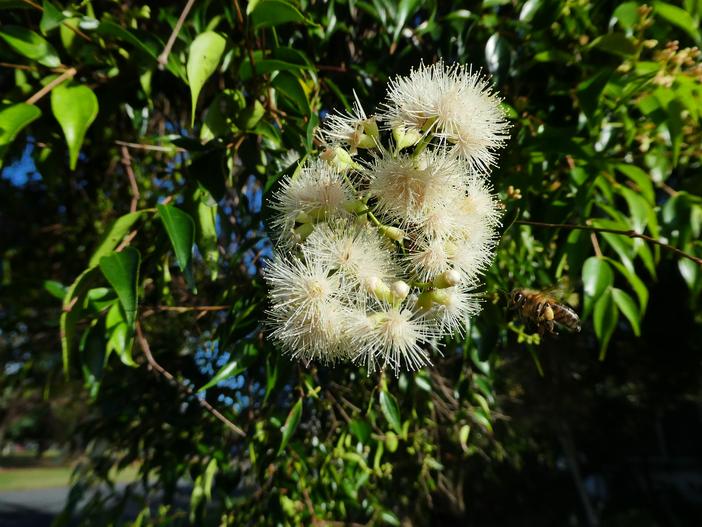Small-Leaved Lilly Pilly
(Syzygium luehmannii)
Small-Leaved Lilly Pilly (Syzygium luehmannii)
/
/

Steve Fitzgerald
CC BY-SA 4.0
Image By:
Steve Fitzgerald
Recorded By:
Copyright:
CC BY-SA 4.0
Copyright Notice:
Photo by: Steve Fitzgerald | License Type: CC BY-SA 4.0 | License URL: https://creativecommons.org/licenses/by-sa/4.0 | Uploader: Junglenut | Publisher: Wikipedia Commons
































Estimated Native Range
Summary
Syzygium luehmannii, commonly known as Small-Leaved Lilly Pilly, is an evergreen tree native to the rainforests of coastal Queensland and New South Wales in Australia. It typically grows to a height of 6-45 feet (2-14 meters) and a width of 9-15 feet (3-5 meters), with a dense canopy of glossy green leaves. The tree’s appearance is characterized by its smooth, pink to reddish-brown bark and its small, lance-shaped leaves. Small-Leaved Lilly Pilly produces clusters of cream-colored flowers in the fall and winter, which are followed by showy, pear-shaped red berries, known as riberries. These berries mature from December to February and are notable for their tart, cranberry-like flavor with a hint of cloves.
The Small-Leaved Lilly Pilly is valued for its ornamental foliage, flowers, and edible fruit, making it a popular choice for urban planting, hedges, and as a feature tree in gardens. It is also appreciated for its relatively low maintenance requirements. This species prefers full sun to part shade, medium amounts of water, and well-drained soils. It is tolerant of light frosts and can adapt to a range of soil types. In addition to its use in landscaping, the riberry fruit is used in culinary applications and has gained popularity as a gourmet bushfood since the early 1980s. While generally pest-resistant, it can be susceptible to psyllids, which cause lumpy growths on the leaves but are usually not harmful to the tree’s overall health.CC BY-SA 4.0
The Small-Leaved Lilly Pilly is valued for its ornamental foliage, flowers, and edible fruit, making it a popular choice for urban planting, hedges, and as a feature tree in gardens. It is also appreciated for its relatively low maintenance requirements. This species prefers full sun to part shade, medium amounts of water, and well-drained soils. It is tolerant of light frosts and can adapt to a range of soil types. In addition to its use in landscaping, the riberry fruit is used in culinary applications and has gained popularity as a gourmet bushfood since the early 1980s. While generally pest-resistant, it can be susceptible to psyllids, which cause lumpy growths on the leaves but are usually not harmful to the tree’s overall health.CC BY-SA 4.0
Plant Description
- Plant Type: Tree
- Height: 6-45 feet
- Width: 9-15 feet
- Growth Rate: Moderate
- Flower Color: Cream
- Flowering Season: Fall, Winter
- Leaf Retention: Evergreen
Growth Requirements
- Sun: Full Sun
- Water: Medium
- Drainage: Medium, Fast
Common Uses
Bee Garden, Butterfly Garden, Hedges, Low Maintenance, Street Planting
Natural Habitat
Rainforests of coastal Queensland and New South Wales in Australia
Other Names
Common Names: Ribery, Cherry Satinash
Scientific Names: , Syzygium luehmannii, Eugenia parvifolia, Eugenia luehmannii, Austromyrtus exaltata, Eugenia leptantha var. parvifolia, Myrtus exaltata,
GBIF Accepted Name: Syzygium luehmannii (F.Muell.) L.A.S.Johnson